Does International Human Rights Law Reconcile Civilizations? Essay
VerifiedAdded on 2023/04/20
|10
|2403
|459
Essay
AI Summary
This essay explores the complex relationship between international human rights law and the reconciliation of civilizations. It begins by defining human rights and international law, emphasizing the inherent nature of human rights and the obligations of governments to protect them. The essay highlights the role of the United Nations in establishing international human rights law and mechanisms for its enforcement. It then delves into the concept of civilization, arguing that international human rights law has played a crucial role in reconciling different civilizations through the promotion of human dignity, respect for human life, and social inclusion. The essay discusses how human rights have reduced negative dynamics associated with different approaches to civilization, and how international treaties and laws have promoted respect for human life and eliminated practices that undermine civilization. Furthermore, it explores the impact of international human rights law on social and political spheres, including the importance of voting and free communication. The essay also addresses the concept of cultural relativism and universalism, suggesting that while cultural factors are important, the universal application of human rights is essential for reconciling civilizations. The conclusion emphasizes that human rights can exist within a socially sensitive universal framework, which requires reframing the present human rights discourse and recognizing the dynamic and changing nature of the social self.
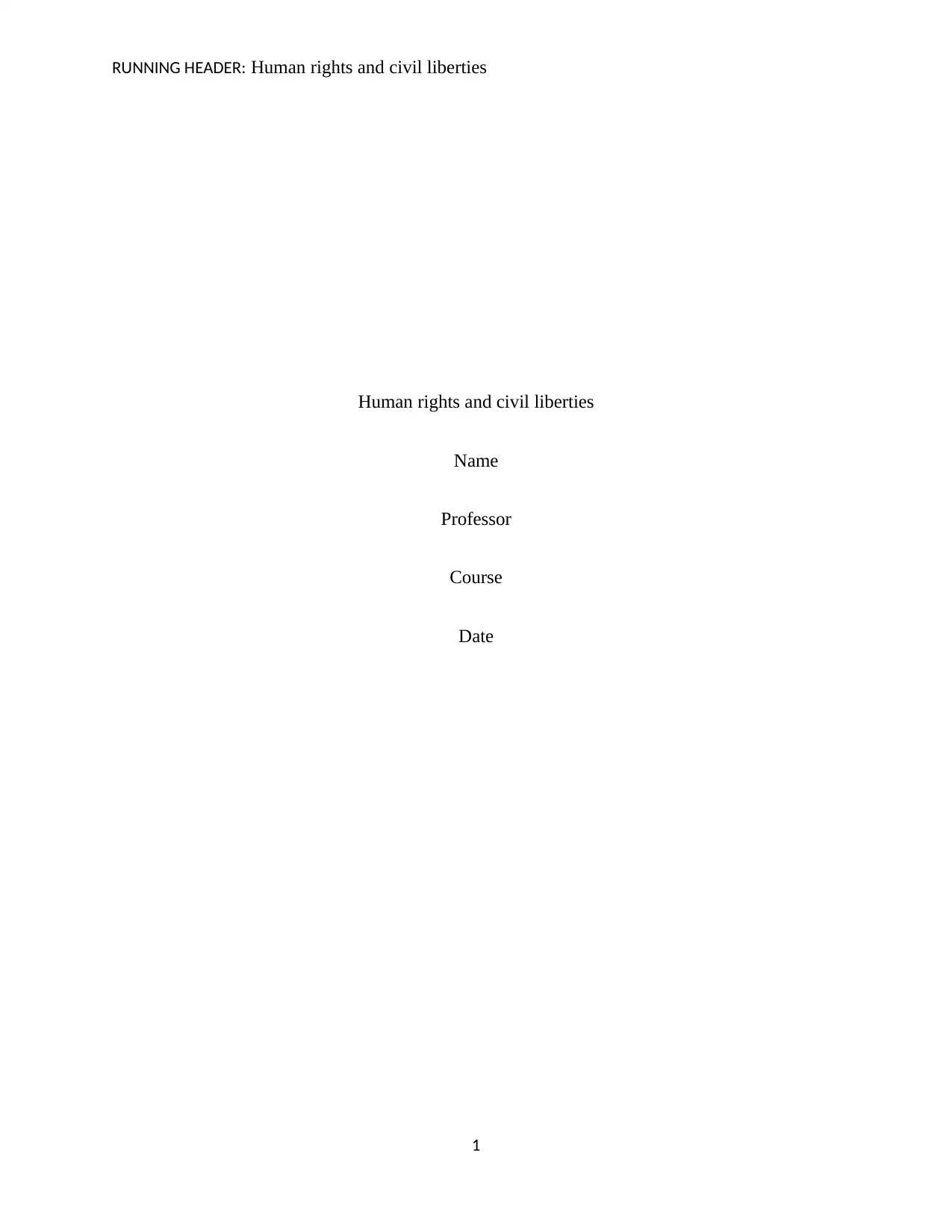
RUNNING HEADER: Human rights and civil liberties
Human rights and civil liberties
Name
Professor
Course
Date
1
Human rights and civil liberties
Name
Professor
Course
Date
1
Paraphrase This Document
Need a fresh take? Get an instant paraphrase of this document with our AI Paraphraser
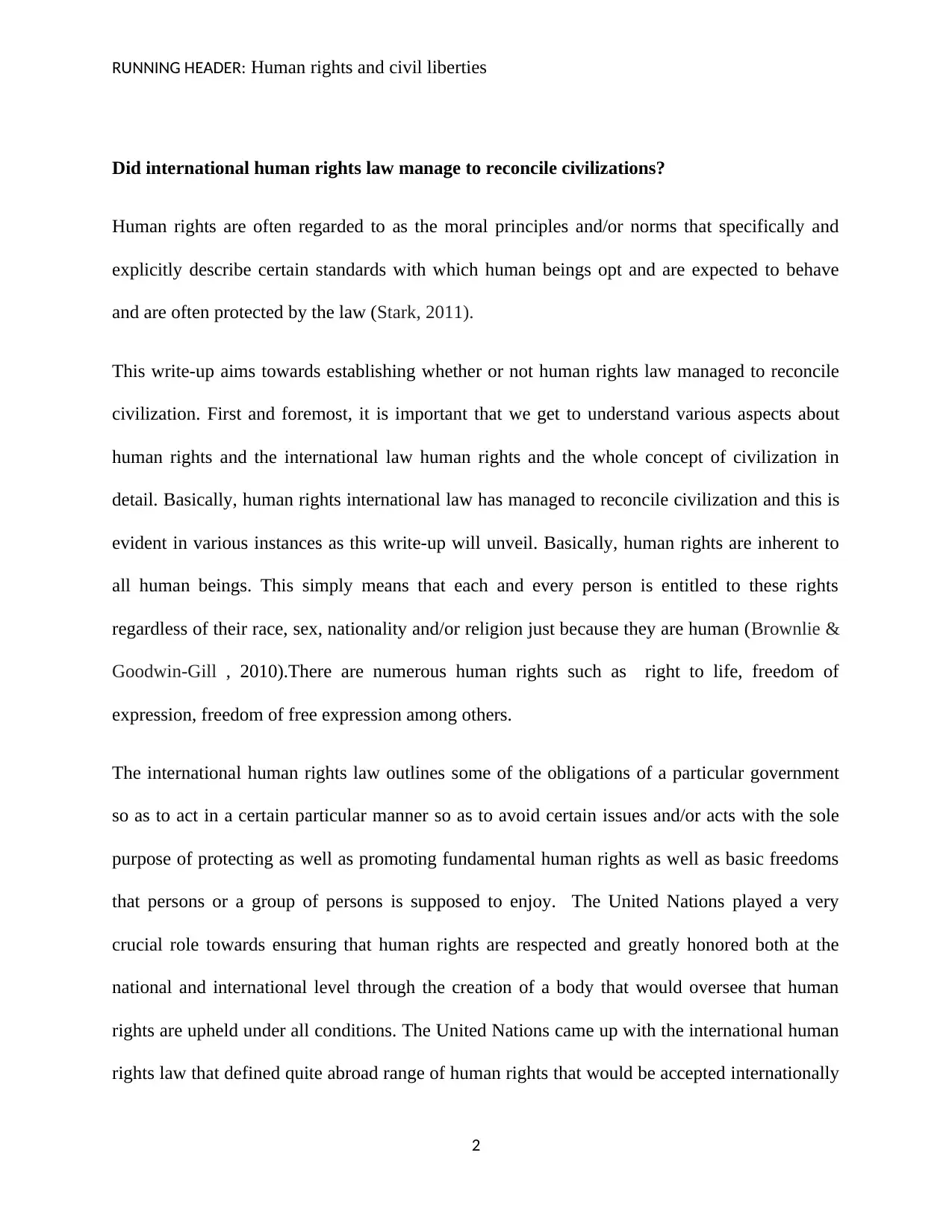
RUNNING HEADER: Human rights and civil liberties
Did international human rights law manage to reconcile civilizations?
Human rights are often regarded to as the moral principles and/or norms that specifically and
explicitly describe certain standards with which human beings opt and are expected to behave
and are often protected by the law (Stark, 2011).
This write-up aims towards establishing whether or not human rights law managed to reconcile
civilization. First and foremost, it is important that we get to understand various aspects about
human rights and the international law human rights and the whole concept of civilization in
detail. Basically, human rights international law has managed to reconcile civilization and this is
evident in various instances as this write-up will unveil. Basically, human rights are inherent to
all human beings. This simply means that each and every person is entitled to these rights
regardless of their race, sex, nationality and/or religion just because they are human (Brownlie &
Goodwin-Gill , 2010).There are numerous human rights such as right to life, freedom of
expression, freedom of free expression among others.
The international human rights law outlines some of the obligations of a particular government
so as to act in a certain particular manner so as to avoid certain issues and/or acts with the sole
purpose of protecting as well as promoting fundamental human rights as well as basic freedoms
that persons or a group of persons is supposed to enjoy. The United Nations played a very
crucial role towards ensuring that human rights are respected and greatly honored both at the
national and international level through the creation of a body that would oversee that human
rights are upheld under all conditions. The United Nations came up with the international human
rights law that defined quite abroad range of human rights that would be accepted internationally
2
Did international human rights law manage to reconcile civilizations?
Human rights are often regarded to as the moral principles and/or norms that specifically and
explicitly describe certain standards with which human beings opt and are expected to behave
and are often protected by the law (Stark, 2011).
This write-up aims towards establishing whether or not human rights law managed to reconcile
civilization. First and foremost, it is important that we get to understand various aspects about
human rights and the international law human rights and the whole concept of civilization in
detail. Basically, human rights international law has managed to reconcile civilization and this is
evident in various instances as this write-up will unveil. Basically, human rights are inherent to
all human beings. This simply means that each and every person is entitled to these rights
regardless of their race, sex, nationality and/or religion just because they are human (Brownlie &
Goodwin-Gill , 2010).There are numerous human rights such as right to life, freedom of
expression, freedom of free expression among others.
The international human rights law outlines some of the obligations of a particular government
so as to act in a certain particular manner so as to avoid certain issues and/or acts with the sole
purpose of protecting as well as promoting fundamental human rights as well as basic freedoms
that persons or a group of persons is supposed to enjoy. The United Nations played a very
crucial role towards ensuring that human rights are respected and greatly honored both at the
national and international level through the creation of a body that would oversee that human
rights are upheld under all conditions. The United Nations came up with the international human
rights law that defined quite abroad range of human rights that would be accepted internationally
2
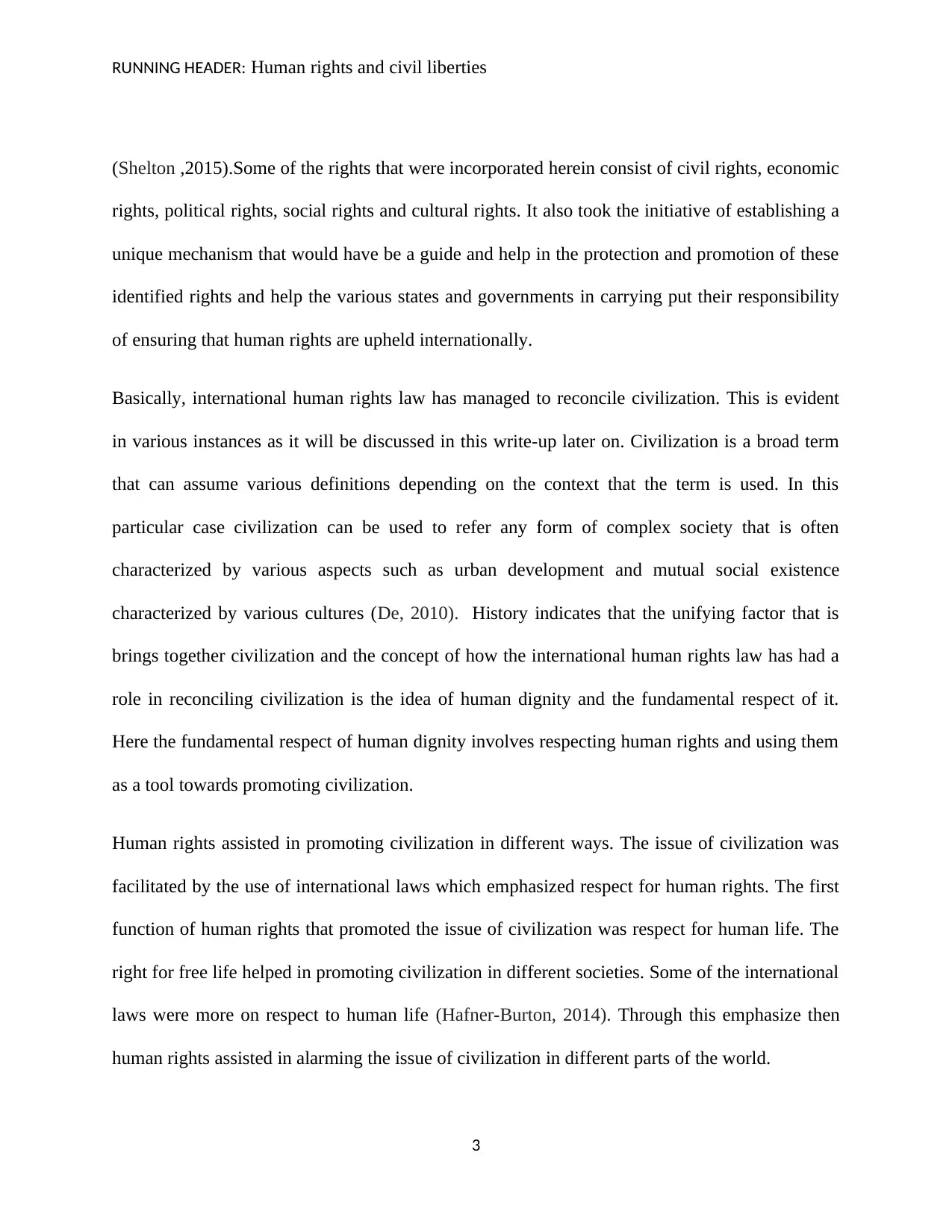
RUNNING HEADER: Human rights and civil liberties
(Shelton ,2015).Some of the rights that were incorporated herein consist of civil rights, economic
rights, political rights, social rights and cultural rights. It also took the initiative of establishing a
unique mechanism that would have be a guide and help in the protection and promotion of these
identified rights and help the various states and governments in carrying put their responsibility
of ensuring that human rights are upheld internationally.
Basically, international human rights law has managed to reconcile civilization. This is evident
in various instances as it will be discussed in this write-up later on. Civilization is a broad term
that can assume various definitions depending on the context that the term is used. In this
particular case civilization can be used to refer any form of complex society that is often
characterized by various aspects such as urban development and mutual social existence
characterized by various cultures (De, 2010). History indicates that the unifying factor that is
brings together civilization and the concept of how the international human rights law has had a
role in reconciling civilization is the idea of human dignity and the fundamental respect of it.
Here the fundamental respect of human dignity involves respecting human rights and using them
as a tool towards promoting civilization.
Human rights assisted in promoting civilization in different ways. The issue of civilization was
facilitated by the use of international laws which emphasized respect for human rights. The first
function of human rights that promoted the issue of civilization was respect for human life. The
right for free life helped in promoting civilization in different societies. Some of the international
laws were more on respect to human life (Hafner-Burton, 2014). Through this emphasize then
human rights assisted in alarming the issue of civilization in different parts of the world.
3
(Shelton ,2015).Some of the rights that were incorporated herein consist of civil rights, economic
rights, political rights, social rights and cultural rights. It also took the initiative of establishing a
unique mechanism that would have be a guide and help in the protection and promotion of these
identified rights and help the various states and governments in carrying put their responsibility
of ensuring that human rights are upheld internationally.
Basically, international human rights law has managed to reconcile civilization. This is evident
in various instances as it will be discussed in this write-up later on. Civilization is a broad term
that can assume various definitions depending on the context that the term is used. In this
particular case civilization can be used to refer any form of complex society that is often
characterized by various aspects such as urban development and mutual social existence
characterized by various cultures (De, 2010). History indicates that the unifying factor that is
brings together civilization and the concept of how the international human rights law has had a
role in reconciling civilization is the idea of human dignity and the fundamental respect of it.
Here the fundamental respect of human dignity involves respecting human rights and using them
as a tool towards promoting civilization.
Human rights assisted in promoting civilization in different ways. The issue of civilization was
facilitated by the use of international laws which emphasized respect for human rights. The first
function of human rights that promoted the issue of civilization was respect for human life. The
right for free life helped in promoting civilization in different societies. Some of the international
laws were more on respect to human life (Hafner-Burton, 2014). Through this emphasize then
human rights assisted in alarming the issue of civilization in different parts of the world.
3
⊘ This is a preview!⊘
Do you want full access?
Subscribe today to unlock all pages.

Trusted by 1+ million students worldwide
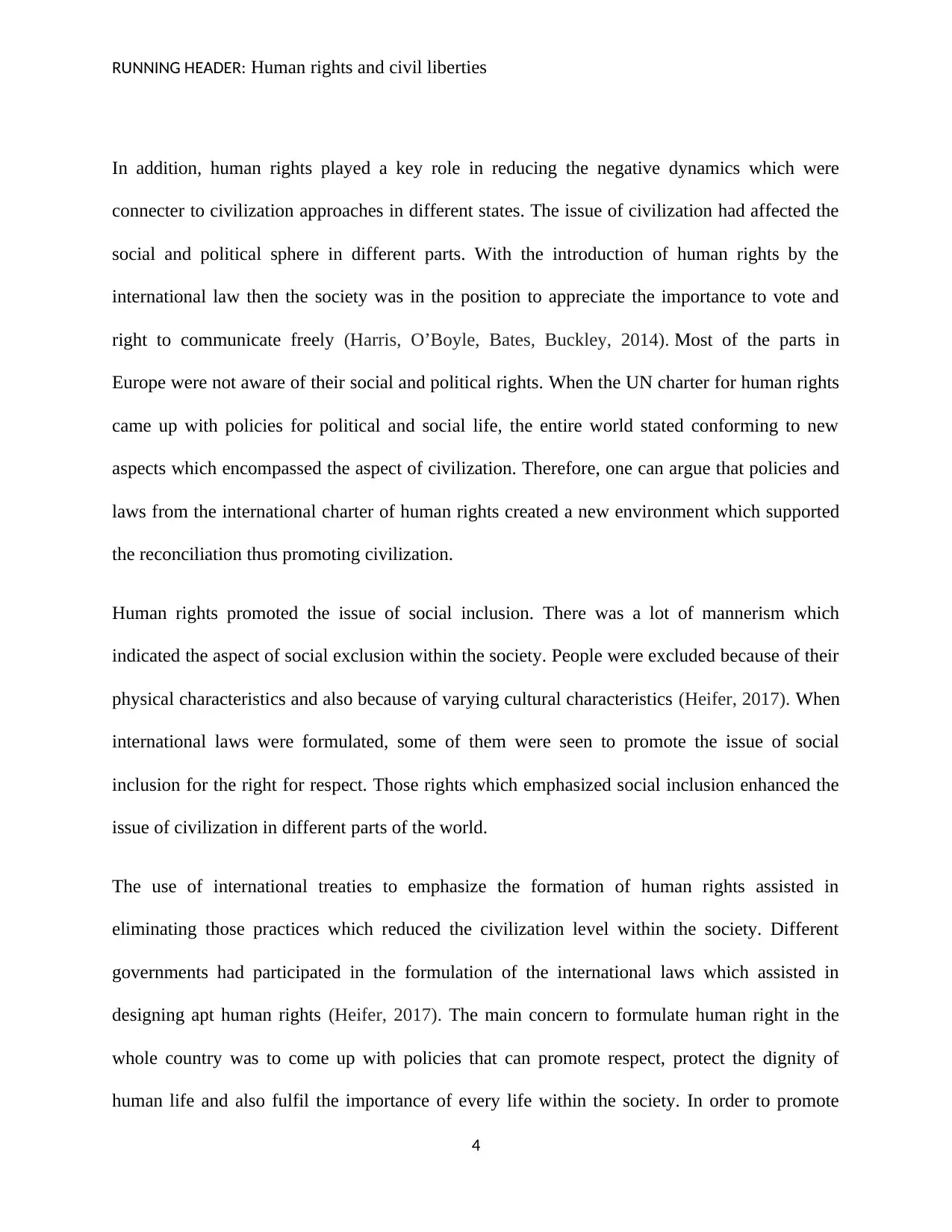
RUNNING HEADER: Human rights and civil liberties
In addition, human rights played a key role in reducing the negative dynamics which were
connecter to civilization approaches in different states. The issue of civilization had affected the
social and political sphere in different parts. With the introduction of human rights by the
international law then the society was in the position to appreciate the importance to vote and
right to communicate freely (Harris, O’Boyle, Bates, Buckley, 2014). Most of the parts in
Europe were not aware of their social and political rights. When the UN charter for human rights
came up with policies for political and social life, the entire world stated conforming to new
aspects which encompassed the aspect of civilization. Therefore, one can argue that policies and
laws from the international charter of human rights created a new environment which supported
the reconciliation thus promoting civilization.
Human rights promoted the issue of social inclusion. There was a lot of mannerism which
indicated the aspect of social exclusion within the society. People were excluded because of their
physical characteristics and also because of varying cultural characteristics (Heifer, 2017). When
international laws were formulated, some of them were seen to promote the issue of social
inclusion for the right for respect. Those rights which emphasized social inclusion enhanced the
issue of civilization in different parts of the world.
The use of international treaties to emphasize the formation of human rights assisted in
eliminating those practices which reduced the civilization level within the society. Different
governments had participated in the formulation of the international laws which assisted in
designing apt human rights (Heifer, 2017). The main concern to formulate human right in the
whole country was to come up with policies that can promote respect, protect the dignity of
human life and also fulfil the importance of every life within the society. In order to promote
4
In addition, human rights played a key role in reducing the negative dynamics which were
connecter to civilization approaches in different states. The issue of civilization had affected the
social and political sphere in different parts. With the introduction of human rights by the
international law then the society was in the position to appreciate the importance to vote and
right to communicate freely (Harris, O’Boyle, Bates, Buckley, 2014). Most of the parts in
Europe were not aware of their social and political rights. When the UN charter for human rights
came up with policies for political and social life, the entire world stated conforming to new
aspects which encompassed the aspect of civilization. Therefore, one can argue that policies and
laws from the international charter of human rights created a new environment which supported
the reconciliation thus promoting civilization.
Human rights promoted the issue of social inclusion. There was a lot of mannerism which
indicated the aspect of social exclusion within the society. People were excluded because of their
physical characteristics and also because of varying cultural characteristics (Heifer, 2017). When
international laws were formulated, some of them were seen to promote the issue of social
inclusion for the right for respect. Those rights which emphasized social inclusion enhanced the
issue of civilization in different parts of the world.
The use of international treaties to emphasize the formation of human rights assisted in
eliminating those practices which reduced the civilization level within the society. Different
governments had participated in the formulation of the international laws which assisted in
designing apt human rights (Heifer, 2017). The main concern to formulate human right in the
whole country was to come up with policies that can promote respect, protect the dignity of
human life and also fulfil the importance of every life within the society. In order to promote
4
Paraphrase This Document
Need a fresh take? Get an instant paraphrase of this document with our AI Paraphraser
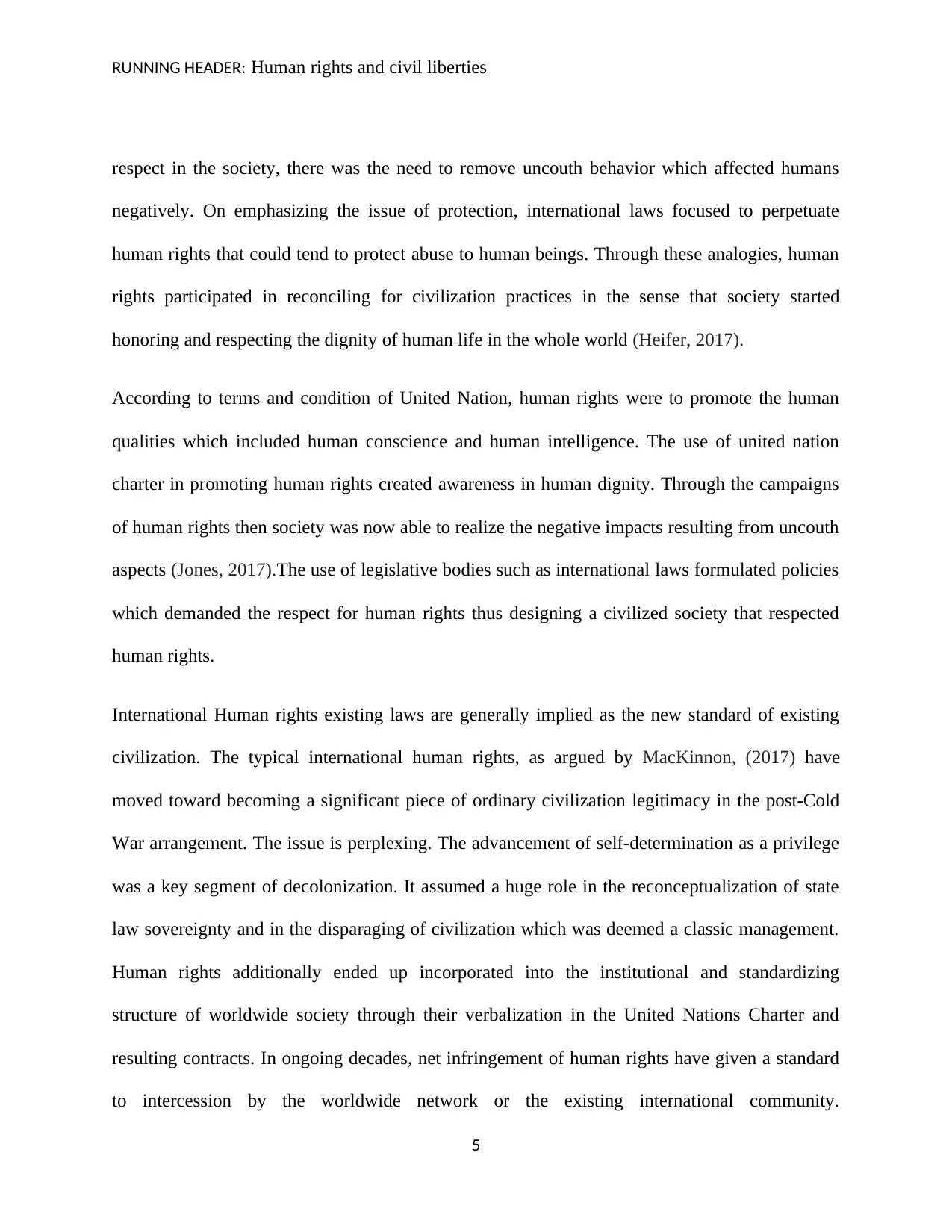
RUNNING HEADER: Human rights and civil liberties
respect in the society, there was the need to remove uncouth behavior which affected humans
negatively. On emphasizing the issue of protection, international laws focused to perpetuate
human rights that could tend to protect abuse to human beings. Through these analogies, human
rights participated in reconciling for civilization practices in the sense that society started
honoring and respecting the dignity of human life in the whole world (Heifer, 2017).
According to terms and condition of United Nation, human rights were to promote the human
qualities which included human conscience and human intelligence. The use of united nation
charter in promoting human rights created awareness in human dignity. Through the campaigns
of human rights then society was now able to realize the negative impacts resulting from uncouth
aspects (Jones, 2017).The use of legislative bodies such as international laws formulated policies
which demanded the respect for human rights thus designing a civilized society that respected
human rights.
International Human rights existing laws are generally implied as the new standard of existing
civilization. The typical international human rights, as argued by MacKinnon, (2017) have
moved toward becoming a significant piece of ordinary civilization legitimacy in the post-Cold
War arrangement. The issue is perplexing. The advancement of self-determination as a privilege
was a key segment of decolonization. It assumed a huge role in the reconceptualization of state
law sovereignty and in the disparaging of civilization which was deemed a classic management.
Human rights additionally ended up incorporated into the institutional and standardizing
structure of worldwide society through their verbalization in the United Nations Charter and
resulting contracts. In ongoing decades, net infringement of human rights have given a standard
to intercession by the worldwide network or the existing international community.
5
respect in the society, there was the need to remove uncouth behavior which affected humans
negatively. On emphasizing the issue of protection, international laws focused to perpetuate
human rights that could tend to protect abuse to human beings. Through these analogies, human
rights participated in reconciling for civilization practices in the sense that society started
honoring and respecting the dignity of human life in the whole world (Heifer, 2017).
According to terms and condition of United Nation, human rights were to promote the human
qualities which included human conscience and human intelligence. The use of united nation
charter in promoting human rights created awareness in human dignity. Through the campaigns
of human rights then society was now able to realize the negative impacts resulting from uncouth
aspects (Jones, 2017).The use of legislative bodies such as international laws formulated policies
which demanded the respect for human rights thus designing a civilized society that respected
human rights.
International Human rights existing laws are generally implied as the new standard of existing
civilization. The typical international human rights, as argued by MacKinnon, (2017) have
moved toward becoming a significant piece of ordinary civilization legitimacy in the post-Cold
War arrangement. The issue is perplexing. The advancement of self-determination as a privilege
was a key segment of decolonization. It assumed a huge role in the reconceptualization of state
law sovereignty and in the disparaging of civilization which was deemed a classic management.
Human rights additionally ended up incorporated into the institutional and standardizing
structure of worldwide society through their verbalization in the United Nations Charter and
resulting contracts. In ongoing decades, net infringement of human rights have given a standard
to intercession by the worldwide network or the existing international community.
5
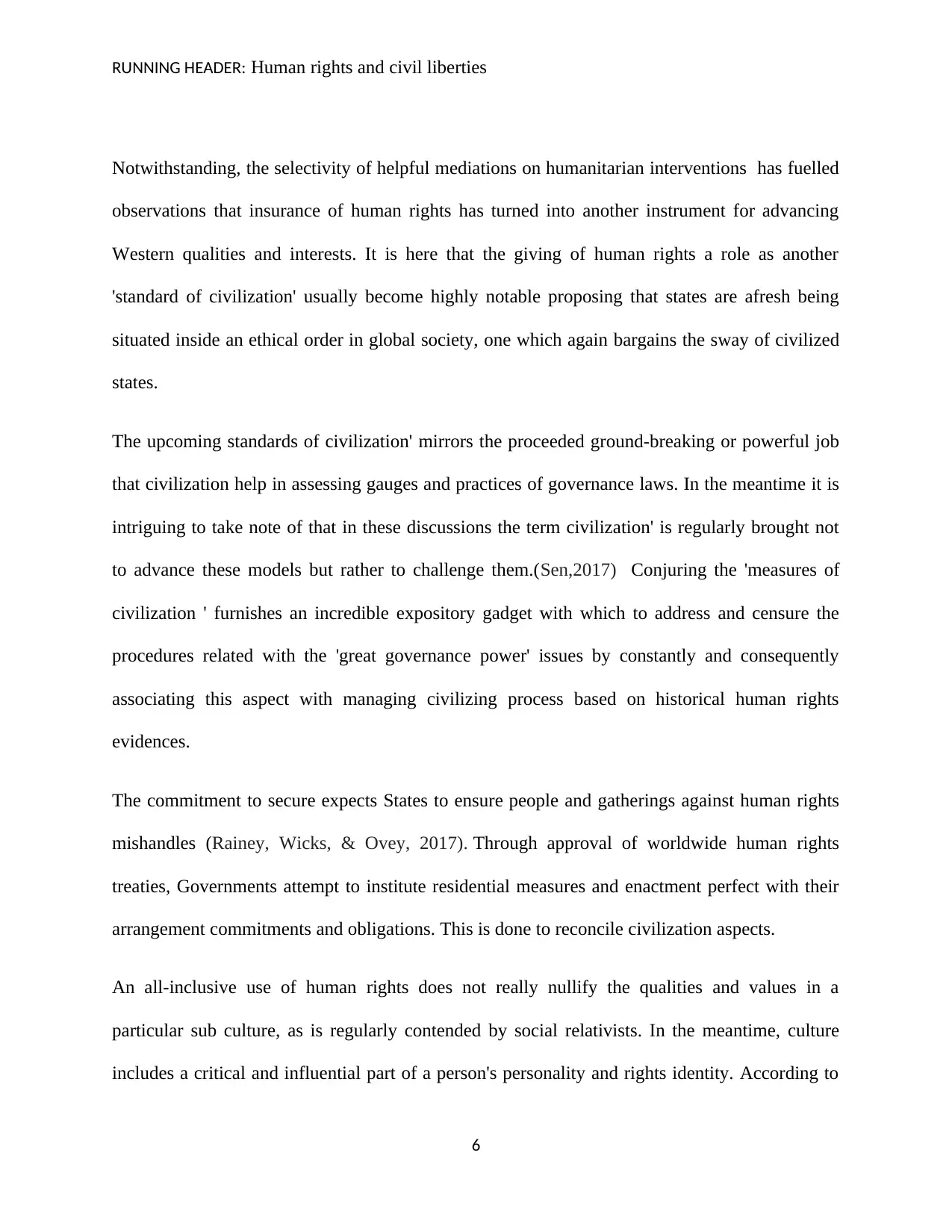
RUNNING HEADER: Human rights and civil liberties
Notwithstanding, the selectivity of helpful mediations on humanitarian interventions has fuelled
observations that insurance of human rights has turned into another instrument for advancing
Western qualities and interests. It is here that the giving of human rights a role as another
'standard of civilization' usually become highly notable proposing that states are afresh being
situated inside an ethical order in global society, one which again bargains the sway of civilized
states.
The upcoming standards of civilization' mirrors the proceeded ground-breaking or powerful job
that civilization help in assessing gauges and practices of governance laws. In the meantime it is
intriguing to take note of that in these discussions the term civilization' is regularly brought not
to advance these models but rather to challenge them.(Sen,2017) Conjuring the 'measures of
civilization ' furnishes an incredible expository gadget with which to address and censure the
procedures related with the 'great governance power' issues by constantly and consequently
associating this aspect with managing civilizing process based on historical human rights
evidences.
The commitment to secure expects States to ensure people and gatherings against human rights
mishandles (Rainey, Wicks, & Ovey, 2017). Through approval of worldwide human rights
treaties, Governments attempt to institute residential measures and enactment perfect with their
arrangement commitments and obligations. This is done to reconcile civilization aspects.
An all-inclusive use of human rights does not really nullify the qualities and values in a
particular sub culture, as is regularly contended by social relativists. In the meantime, culture
includes a critical and influential part of a person's personality and rights identity. According to
6
Notwithstanding, the selectivity of helpful mediations on humanitarian interventions has fuelled
observations that insurance of human rights has turned into another instrument for advancing
Western qualities and interests. It is here that the giving of human rights a role as another
'standard of civilization' usually become highly notable proposing that states are afresh being
situated inside an ethical order in global society, one which again bargains the sway of civilized
states.
The upcoming standards of civilization' mirrors the proceeded ground-breaking or powerful job
that civilization help in assessing gauges and practices of governance laws. In the meantime it is
intriguing to take note of that in these discussions the term civilization' is regularly brought not
to advance these models but rather to challenge them.(Sen,2017) Conjuring the 'measures of
civilization ' furnishes an incredible expository gadget with which to address and censure the
procedures related with the 'great governance power' issues by constantly and consequently
associating this aspect with managing civilizing process based on historical human rights
evidences.
The commitment to secure expects States to ensure people and gatherings against human rights
mishandles (Rainey, Wicks, & Ovey, 2017). Through approval of worldwide human rights
treaties, Governments attempt to institute residential measures and enactment perfect with their
arrangement commitments and obligations. This is done to reconcile civilization aspects.
An all-inclusive use of human rights does not really nullify the qualities and values in a
particular sub culture, as is regularly contended by social relativists. In the meantime, culture
includes a critical and influential part of a person's personality and rights identity. According to
6
⊘ This is a preview!⊘
Do you want full access?
Subscribe today to unlock all pages.

Trusted by 1+ million students worldwide
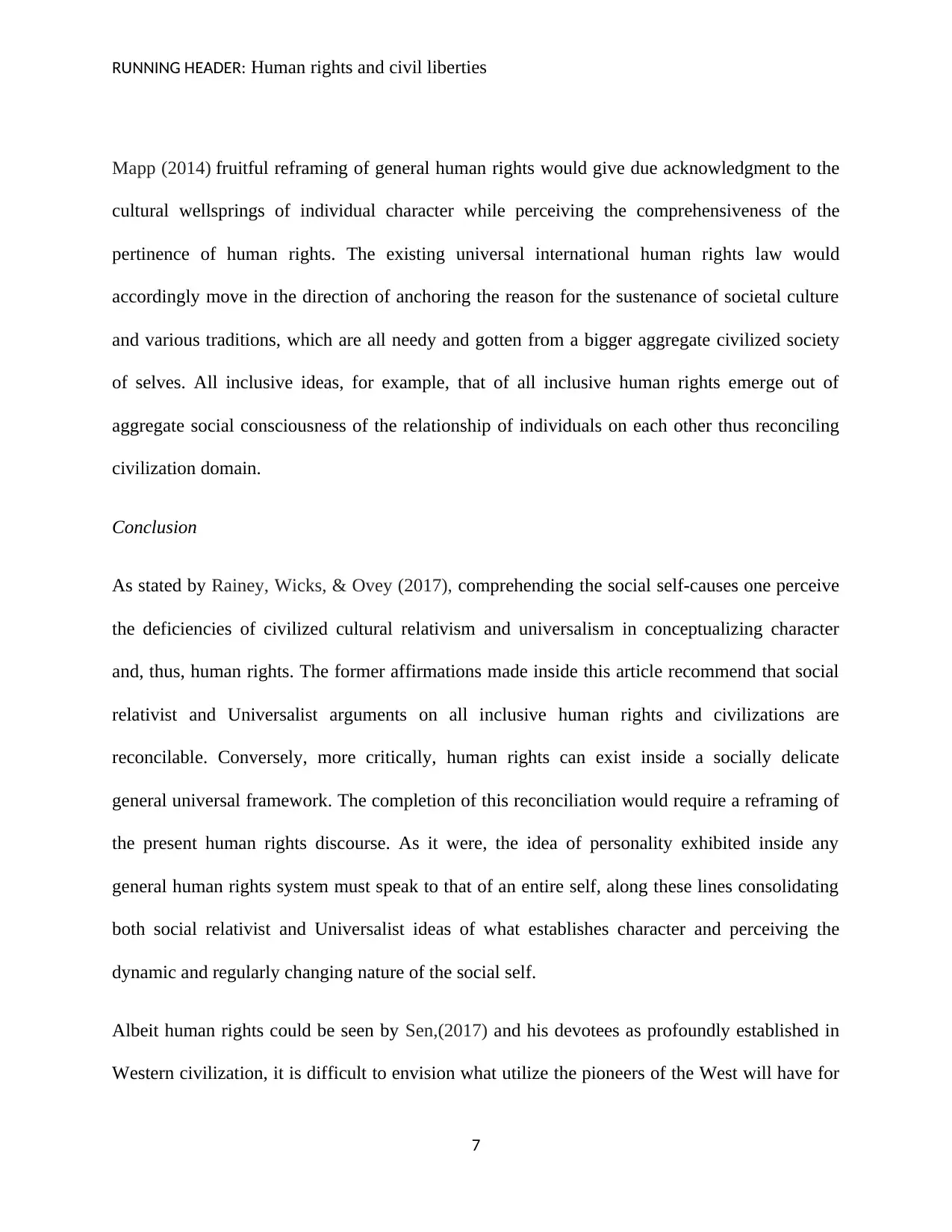
RUNNING HEADER: Human rights and civil liberties
Mapp (2014) fruitful reframing of general human rights would give due acknowledgment to the
cultural wellsprings of individual character while perceiving the comprehensiveness of the
pertinence of human rights. The existing universal international human rights law would
accordingly move in the direction of anchoring the reason for the sustenance of societal culture
and various traditions, which are all needy and gotten from a bigger aggregate civilized society
of selves. All inclusive ideas, for example, that of all inclusive human rights emerge out of
aggregate social consciousness of the relationship of individuals on each other thus reconciling
civilization domain.
Conclusion
As stated by Rainey, Wicks, & Ovey (2017), comprehending the social self-causes one perceive
the deficiencies of civilized cultural relativism and universalism in conceptualizing character
and, thus, human rights. The former affirmations made inside this article recommend that social
relativist and Universalist arguments on all inclusive human rights and civilizations are
reconcilable. Conversely, more critically, human rights can exist inside a socially delicate
general universal framework. The completion of this reconciliation would require a reframing of
the present human rights discourse. As it were, the idea of personality exhibited inside any
general human rights system must speak to that of an entire self, along these lines consolidating
both social relativist and Universalist ideas of what establishes character and perceiving the
dynamic and regularly changing nature of the social self.
Albeit human rights could be seen by Sen,(2017) and his devotees as profoundly established in
Western civilization, it is difficult to envision what utilize the pioneers of the West will have for
7
Mapp (2014) fruitful reframing of general human rights would give due acknowledgment to the
cultural wellsprings of individual character while perceiving the comprehensiveness of the
pertinence of human rights. The existing universal international human rights law would
accordingly move in the direction of anchoring the reason for the sustenance of societal culture
and various traditions, which are all needy and gotten from a bigger aggregate civilized society
of selves. All inclusive ideas, for example, that of all inclusive human rights emerge out of
aggregate social consciousness of the relationship of individuals on each other thus reconciling
civilization domain.
Conclusion
As stated by Rainey, Wicks, & Ovey (2017), comprehending the social self-causes one perceive
the deficiencies of civilized cultural relativism and universalism in conceptualizing character
and, thus, human rights. The former affirmations made inside this article recommend that social
relativist and Universalist arguments on all inclusive human rights and civilizations are
reconcilable. Conversely, more critically, human rights can exist inside a socially delicate
general universal framework. The completion of this reconciliation would require a reframing of
the present human rights discourse. As it were, the idea of personality exhibited inside any
general human rights system must speak to that of an entire self, along these lines consolidating
both social relativist and Universalist ideas of what establishes character and perceiving the
dynamic and regularly changing nature of the social self.
Albeit human rights could be seen by Sen,(2017) and his devotees as profoundly established in
Western civilization, it is difficult to envision what utilize the pioneers of the West will have for
7
Paraphrase This Document
Need a fresh take? Get an instant paraphrase of this document with our AI Paraphraser
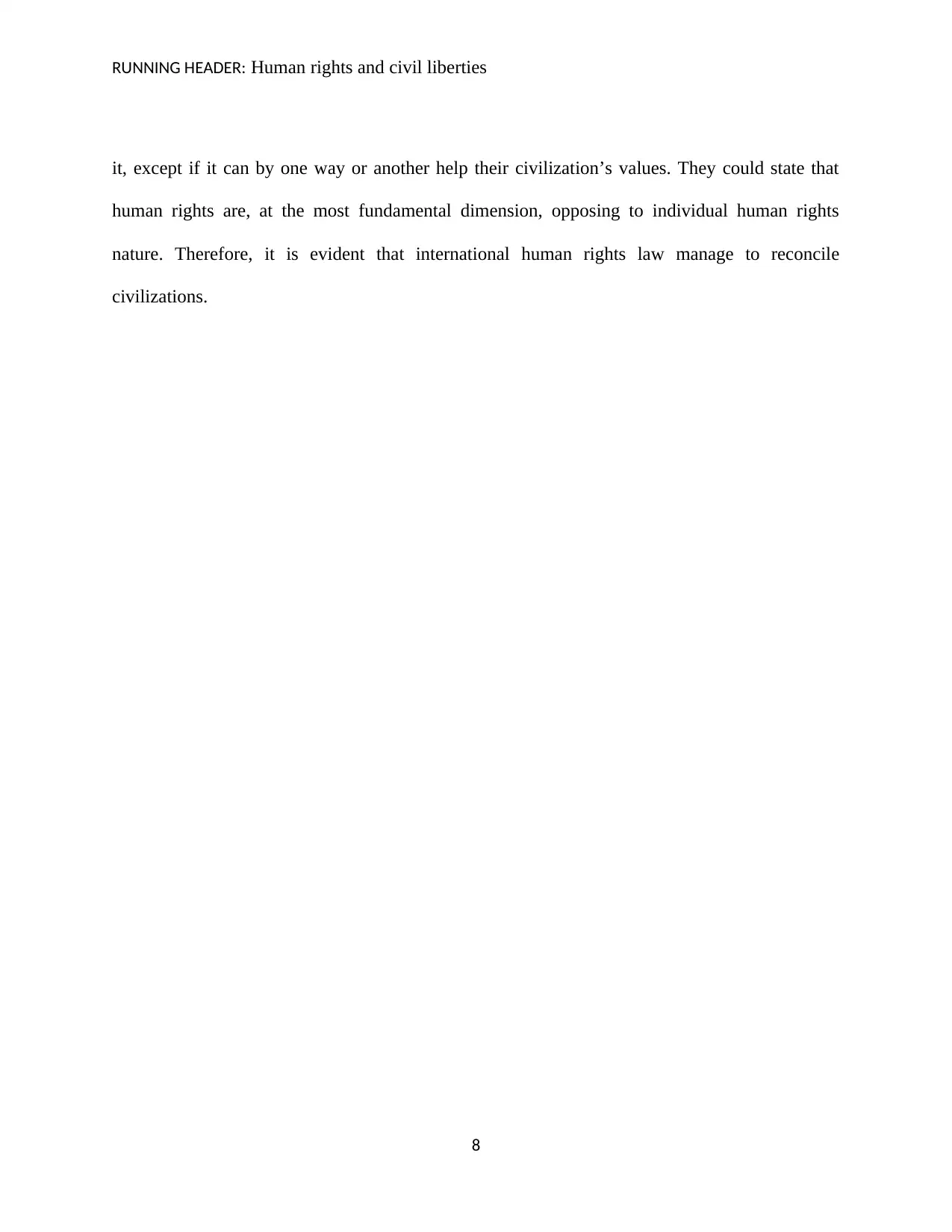
RUNNING HEADER: Human rights and civil liberties
it, except if it can by one way or another help their civilization’s values. They could state that
human rights are, at the most fundamental dimension, opposing to individual human rights
nature. Therefore, it is evident that international human rights law manage to reconcile
civilizations.
8
it, except if it can by one way or another help their civilization’s values. They could state that
human rights are, at the most fundamental dimension, opposing to individual human rights
nature. Therefore, it is evident that international human rights law manage to reconcile
civilizations.
8
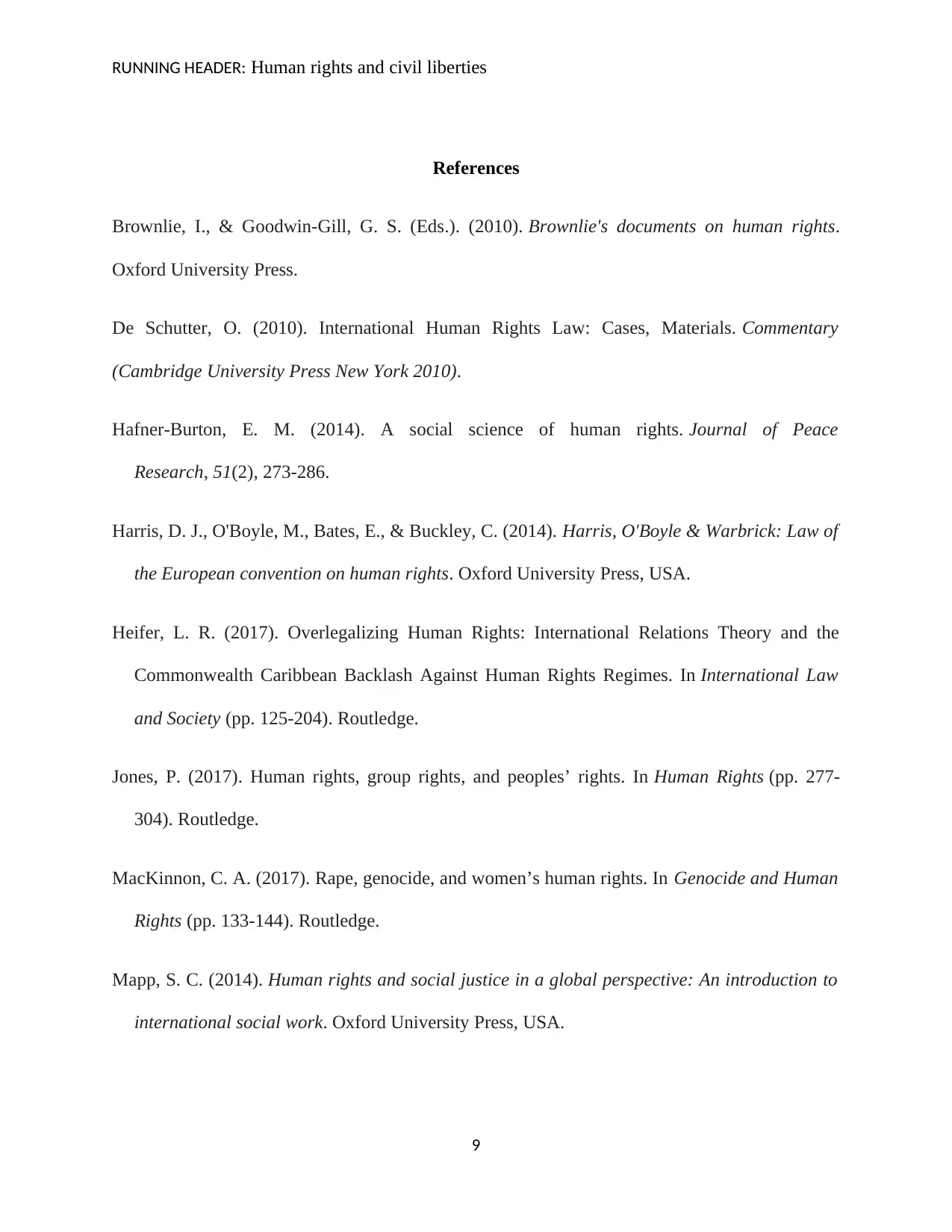
RUNNING HEADER: Human rights and civil liberties
References
Brownlie, I., & Goodwin-Gill, G. S. (Eds.). (2010). Brownlie's documents on human rights.
Oxford University Press.
De Schutter, O. (2010). International Human Rights Law: Cases, Materials. Commentary
(Cambridge University Press New York 2010).
Hafner-Burton, E. M. (2014). A social science of human rights. Journal of Peace
Research, 51(2), 273-286.
Harris, D. J., O'Boyle, M., Bates, E., & Buckley, C. (2014). Harris, O'Boyle & Warbrick: Law of
the European convention on human rights. Oxford University Press, USA.
Heifer, L. R. (2017). Overlegalizing Human Rights: International Relations Theory and the
Commonwealth Caribbean Backlash Against Human Rights Regimes. In International Law
and Society (pp. 125-204). Routledge.
Jones, P. (2017). Human rights, group rights, and peoples’ rights. In Human Rights (pp. 277-
304). Routledge.
MacKinnon, C. A. (2017). Rape, genocide, and women’s human rights. In Genocide and Human
Rights (pp. 133-144). Routledge.
Mapp, S. C. (2014). Human rights and social justice in a global perspective: An introduction to
international social work. Oxford University Press, USA.
9
References
Brownlie, I., & Goodwin-Gill, G. S. (Eds.). (2010). Brownlie's documents on human rights.
Oxford University Press.
De Schutter, O. (2010). International Human Rights Law: Cases, Materials. Commentary
(Cambridge University Press New York 2010).
Hafner-Burton, E. M. (2014). A social science of human rights. Journal of Peace
Research, 51(2), 273-286.
Harris, D. J., O'Boyle, M., Bates, E., & Buckley, C. (2014). Harris, O'Boyle & Warbrick: Law of
the European convention on human rights. Oxford University Press, USA.
Heifer, L. R. (2017). Overlegalizing Human Rights: International Relations Theory and the
Commonwealth Caribbean Backlash Against Human Rights Regimes. In International Law
and Society (pp. 125-204). Routledge.
Jones, P. (2017). Human rights, group rights, and peoples’ rights. In Human Rights (pp. 277-
304). Routledge.
MacKinnon, C. A. (2017). Rape, genocide, and women’s human rights. In Genocide and Human
Rights (pp. 133-144). Routledge.
Mapp, S. C. (2014). Human rights and social justice in a global perspective: An introduction to
international social work. Oxford University Press, USA.
9
⊘ This is a preview!⊘
Do you want full access?
Subscribe today to unlock all pages.

Trusted by 1+ million students worldwide
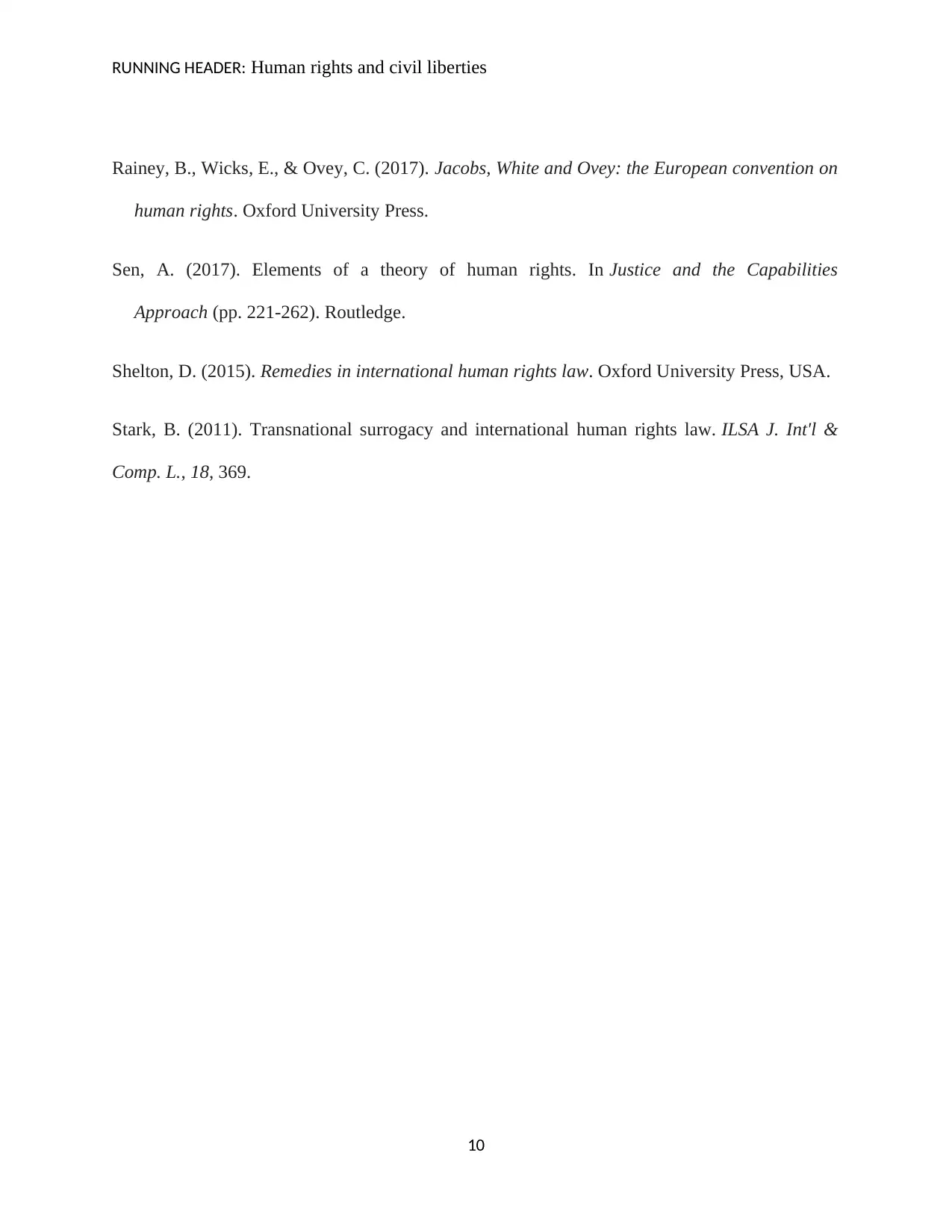
RUNNING HEADER: Human rights and civil liberties
Rainey, B., Wicks, E., & Ovey, C. (2017). Jacobs, White and Ovey: the European convention on
human rights. Oxford University Press.
Sen, A. (2017). Elements of a theory of human rights. In Justice and the Capabilities
Approach (pp. 221-262). Routledge.
Shelton, D. (2015). Remedies in international human rights law. Oxford University Press, USA.
Stark, B. (2011). Transnational surrogacy and international human rights law. ILSA J. Int'l &
Comp. L., 18, 369.
10
Rainey, B., Wicks, E., & Ovey, C. (2017). Jacobs, White and Ovey: the European convention on
human rights. Oxford University Press.
Sen, A. (2017). Elements of a theory of human rights. In Justice and the Capabilities
Approach (pp. 221-262). Routledge.
Shelton, D. (2015). Remedies in international human rights law. Oxford University Press, USA.
Stark, B. (2011). Transnational surrogacy and international human rights law. ILSA J. Int'l &
Comp. L., 18, 369.
10
1 out of 10
Related Documents
Your All-in-One AI-Powered Toolkit for Academic Success.
+13062052269
info@desklib.com
Available 24*7 on WhatsApp / Email
![[object Object]](/_next/static/media/star-bottom.7253800d.svg)
Unlock your academic potential
Copyright © 2020–2026 A2Z Services. All Rights Reserved. Developed and managed by ZUCOL.





